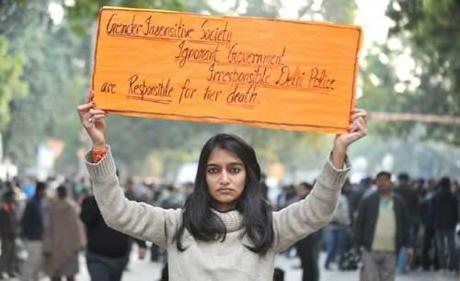
Wivine Mumba Matipa – Congolese Minister of Justice and Human Rights
…if Wivine Mumba Matipa, Minister of Justice and Human Rights and Genevieve Inagosi Minister of Gender, Family and Children, Congolese government officials directly responsible of the women’s condition cannot indicate to the public at least 48 sex offenders every three months and get them imprisoned for committed crimes through the normal judiciary Congolese system, then the population in Kinshasa and across all main cities of DRC, with the help of women organisations in the country would and should stage massive demonstrations to demand the resignation of the two ministers.

Genevieve Inagosi – Congolese Minister of Gender Family and Children
Today I read again in the news the story of this Indian young woman student who was gang-raped and then later on died as a consequence.

India rape protester
“A23-year old medical student was attacked on a bus in Delhi while on her way home from the cinema. The male friend she was with was beaten up and she was raped by six men for over an hour. They also violated her with an iron bar, causing the injuries which eventually led to her death two weeks later. “
The case of Congolese women and girls, who, particularly in the Eastern provinces of the country, are almost experiencing rape constantly, came to mind.
On Tuesday December 11, 2012 Republican Congressman Christopher Smith, Chairman of the Committee on Foreign Affairs indicated that according to the UN Office for Coordination of Humanitarian Affairs, 48 Congolese women and girls were raped every hour in DRC.
In the Congolese government of President Joseph Kabila, two women occupy a privileged position to be accountable about the situation of women in DRC. These personalities are: Wivine Mumba Matipa, Minister of Justice and Human Rights and Genevieve Inagosi Minister of Gender, Family and Children.
My suggestion is that for example if the two ministers directly responsible of the Congolese women’s condition cannot announce to the public at least 48 sex offenders every three months and get them imprisoned for their crimes through the usual judiciary Congolese system, then the Congolese population in Kinshasa or across all main cities of DRC, and beyond in the diaspora, with the help of women organisations in the country would and should stage massive demonstrations to demand their resignation.
A government which cannot protect its women citizens when sex offenders in the hundreds some well known by their victims walk free among them every day without fearing any law enforcement against them, should have concerned officials resign. In these particular cases, the ministers responsible should be made to feel that they are accountable particularly through pressure from women organisations.
Difficult situations demand radical measures. Ministers directly in charge of the Congolese women’s rape issue should be at least capable of showing to the population of hundreds of thousands of women who have been victims for years that they really care about seeing justice done.
What these massively organised protests both inside DRC and in the diaspora will achieve might not necessarily be the resignation of these two Congolese women officials, but they will mainly help to keep in the eyes of the general public all insecurity issues related to that problem which affects women and girls most dramatically.
